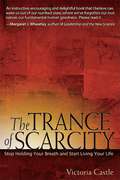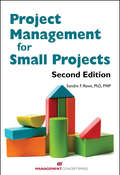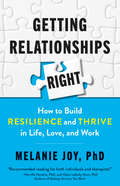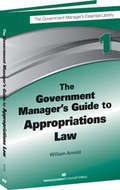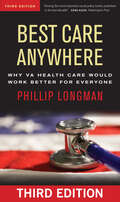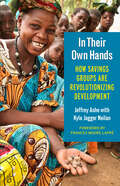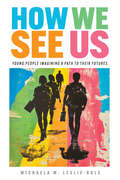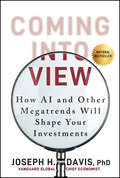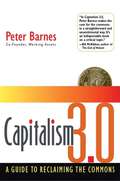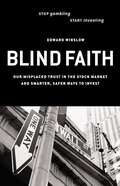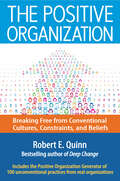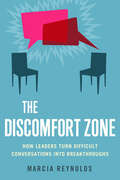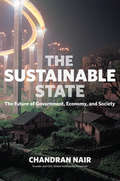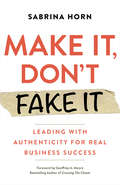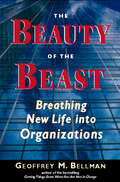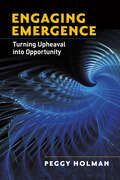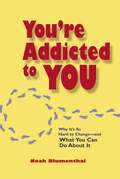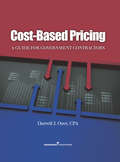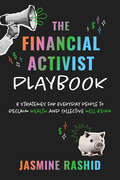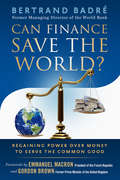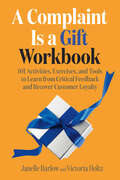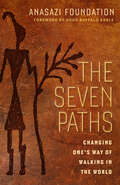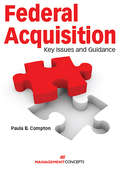- Table View
- List View
The Trance of Scarcity: Stop Holding Your Breath and Start Living Your Life
by Victoria CastleIn her own life and through her work with others, Victoria Castle has repeatedly encountered the tragic theme of "not-enough-ness"--both the "I am not enough" and "There is not enough" varieties--and witnessed how it cripples even the most buoyant and passionate people among us. Castle calls this blight the Trance of Scarcity. It shows up in a hundred personalized versions, but the results are always the same. Instead of expressing our brilliance and creativity, we show the world only the by-products of oppression, isolation, exclusion, and defeat. We spend our time lamenting the way things are, justifying all the reasons they can't be different. In this inspiring and very personal book, Castle shows that there is life on the other side of the Trance -- a life characterized by vitality, fulfillment, and efficacy. She shares specific practices you can use to change your story--to identify and interrupt negative, constraining patterns and replace them with more positive and liberating ones to achieve greater freedom, fulfillment, and satisfaction. With compassion and surprising humor, The Trance of Scarcity will help you embody abundance as your way of being. Once you do, you'll be more inspired and more inspiring, you'll build bridges to replace dead ends, and you'll easily arrive at solutions to issues that once overwhelmed you. Having broken free from the Trance of Scarcity, you'll be able to live a life where ease and plenty emanate from you as naturally as your breath.
Project Management for Small Projects
by Sandra R. Rowe PhD, PMPImportant New Tools for Managing Your Small Projects As Part of a Larger Program!The first edition of Project Management for Small Projects introduced project management processes, tools, and techniques that are scalable and adaptable to small projects. Project managers learned a structured, disciplined approach to managing small projects sensibly and realistically. This new edition is updated throughout to reflect the PMBOK® Guide, Fifth Edition, balancing the particular needs of small projects with the project management methodology.Project managers who are proficient at managing and leading their own projects are increasingly being called upon to work collaboratively with other project managers to lead components of a program. In addition to knowing how to manage processes and how to lead the team, project managers must now also know how to collaborate and share knowledge with other project managers. A new chapter on program management offers important insights and guidance for managing a group of related small projects in a coordinated way to obtain benefits and control not available from managing them individually.
Getting Relationships Right: How to Build Resilience and Thrive in Life, Love, and Work
by Melanie JoyBestselling author, psychologist, and relationship coach Melanie Joy shares the principles and tools that can make any relationship, from personal to professional, healthier and more resilient.Relationships are complicated. Yet it's an unfortunate reality that while most of us have to learn complex geometry that we'll probably never use, we don't get a single formal lesson in how to relate to others. In this one-stop guide, psychologist Melanie Joy reveals the common psychological dynamics that underlie all kinds of relationships—with a romantic partner, friends, family members, colleagues—in short, with anyone in any situation. Understanding these dynamics will help you make all your relationships healthier and more resilient. Relationships are like bodies: they get sick when their immune system is weaker than the germs that stress them. Drawing on the most relevant research as well as on her own extensive experience as a psychologist, Joy explains how to strengthen your relational immune system to resist not only interpersonal stressors but also largely invisible yet potentially devastating societal stressors like racism and sexism. With this understanding, you can cultivate relationships that consistently reflect core moral values and honor the dignity of everyone involved. Resilient relationships are not only a source of joy and fulfillment for those who are in them, they also support the thriving of the organizations and communities of which we all are a part.
The Government Manager's Guide to Appropriations Law
by William G. Arnold CDFM-AThis guide offers sound and easy-to-apply advice to help government managers deal with appropriated funds properly and legally. It follows the organization of the Redbook, the Government Accountability Office's 2,000+ page Principles of Federal Appropriations Law. Government purchase card holders and approvers will find this book especially helpful in understanding the common risks that arise and how to avoid violating the myriad rules and regulations involved.
Best Care Anywhere: Why VA Health Care Would Work Better For Everyone
by Phillip LongmanNEW EDITION, REVISED AND UPDATED Phillip Longman tells the amazing story of the turnaround of the Department of Veterans Affairs health-care system from a dysfunctional, scandal-prone bureaucracy into the benchmark for high-quality medicine in the United States. Best Care Anywhere shows that vast swaths of what we think we know about health, health care, and medical economics are just plain wrong. And the book demonstrates how this extraordinarily cost-effective model, which has proven to be highly popular with veterans, can be made available to everyone. New to this edition is an analysis of how the shortcomings of both so-called Obamacare and Republican plans to privatize Medicare reinforce the need for applying the lessons of the VA. Also included are completely updated statistics and research, as well as examples of how the private sector is already beginning to learn from the VA’s example.
In Their Own Hands: How Savings Groups Are Revolutionizing Development
by Kyla Jagger Neilan Jeffrey AsheTwo and a half billion people worldwide, most of them desperately poor villagers, need a better way to save and to borrow. Even the most innovative banking institutions can&’t reach them; savings groups can. In savings groups, members save what they can in a communal pot and loan their growing fund to each other for their short-term needs. Jeffrey Ashe and Kyla Neilan illustrate how these savings groups form and function and how little &“outside&” support is actually required for their success. Drawing on decades of Ashe&’s personal experience, this book describes how he developed Saving for Change, which leveraged the wisdom and strength of group members to train and establish new groups. This model has impacted the lives of 680,000 people across five countries. Savings groups are a &“catalytic innovation&” that bypasses subsidies, dependency, and high costs while effectively reducing chronic hunger, building assets, and empowering the community. Today, saving groups have 9 million members around the globe—with minimal support, membership could grow to ten times this number.
How We See Us: Young People Imagining a Path to Their Futures (Work and Learning Series)
by Michaela M Leslie-RuleA compelling appeal to center the perspectives of young people to support them in mapping pathways to future success
Coming into View: How AI and Other Megatrends Will Shape Your Investments
by Joseph H. DavisAn expertly crafted evaluation of forces shaping the economy over the coming decade and portfolio management strategies designed to harness them In Coming Into View: How AI and Other Megatrends Will Shape Your Investments, Vanguard’s Global Chief Economist and head of its Investment Strategy Group, Joe Davis, makes a simple and profound argument: that the “status quo” view of the United States economy – one of predictable and relatively constant measures of growth, inflation, and financial returns – is actually deeply unlikely to hold true in the future. The book demonstrates how the promise of artificial intelligence and technological advancement may push against the daunting headwinds of slowing population growth, rising geopolitical tensions and growing national debt, to reshape the economy in ways that conventional thinking overlooks. Davis presents an innovative and original, data-driven framework to consider the probabilities of the coming tug-of-war between AI-fueled growth and inflationary structural fiscal deficits, that can help guide investors as they build investment portfolios to weather uncertain years ahead. Inside the book: Effective strategies for investors attempting to prepare for different economic possibilities and scenarios in the world. New data and models to better quantify the impact of economic forces and uncover the risks of relying on consensus assumptions. Techniques to avoid common investment mistakes in times of economic change, such as doubling down on technology stocks, or avoiding certain types of investments. Guiding investing principles to help achieve greater financial returns, on a risk-adjusted basis. A must-read resource for professional and retail investors, Coming Into View is a startlingly insightful and practical guide for anyone seeking to engage with the financial markets as an informed and confident investor.
Capitalism 3.0: A Guide to Reclaiming the Commons
by Peter BarnesThe commons — those creations of nature and society we inherit together and must preserve for our children — is under siege. Our current version of capitalism — the corporate, globalized version 2.0 — is rapidly squandering this heritage. Now, Peter Barnes offers a solution: protect the commons by giving it property rights and strong institutional managers. Barnes shows how capitalism — like a computer — is run by an operating system. Our current operating system gives too much power to profit-maximizing corporations that devour the commons and distribute most of their profits to a sliver of the population. And government — which in theory should defend the commons — is all too often a tool of those very corporations. Barnes proposes a revised operating system — Capitalism 3.0 — that protects the commons while preserving the many strengths of capitalism as we know it. His major innovation is the commons trust, a market based legal entity with the power to limit the use of scare commons, charge rent, and pay dividends — in both cash and services — to everyone. In Barnes' vision, an array of commons trusts would institutionalize our obligations to future generations, fellow citizens, and nature. Once established, they'd use markets and property rights to create a better world for us all. Capitalism 3.0 offers a practical alternative to our current flawed economic system. It points the way to a future in which we can retain capitalism's virtues while mitigating its vices.
Blind Faith: Our Misplaced Trust in the Stock Market--And Smarter, Safer Ways to Invest
by Edward WinslowThe risk of investing in the stock market has increased remarkably over the last decade. In this period we've seen tremendous volatility in stock prices, a market bubble and its subsequent pop, a parade of corporate scandals, the demise of a leading accounting firm and proven deception by many so-called investment analysts employed by major brokerage firms. In addition, the realities of ever-increasing geopolitical risks contribute to an uncertain economic future. Blind Faith offers a cleverly simple yet revolutionary approach for managing investments in this perpetual high-risk environment. Corporate America and the investment industry have little to gain and lots to lose when investors decide to stop playing the traditional game that can -and has - destroyed trillions of dollars of individual wealth overnight. Readers will be equipped with both the strategy and the tools for success in virtually any economic environment while ending their participation in a system that has taken full advantage of their blind faith and misplaced trust.
The Positive Organization: Breaking Free from Conventional Cultures, Constraints, and Beliefs
by Robert E. QuinnBeholden to accepted assumptions about people and organizations, too many enterprises waste human potential. Robert Quinn shows how to defy convention and create organizations where people feel fully engaged and continually rewarded, where both individually and collectively they flourish and exceed expectations.The problem is that leaders are following a negative and constraining "mental map" that insists organizations must be rigid, top-down hierarchies and that the people in them are driven mainly by self-interest and fear. But leaders can adopt a different mental map, one where organizations are networks of fluid, evolving relationships and where people are motivated by a desire to grow, learn, and serve a larger goal. Using dozens of memorable stories, Quinn describes specific actions leaders can take to facilitate the emergence of this organizational culture—helping people gain a sense of purpose, engage in authentic conversations, see new possibilities, and sacrifice for the common good. The book includes the Positive Organization Generator, a tool that provides 100 real-life practices from positive organizations and helps you reinvent them to fit your specific needs. With the POG you can identify and implement the practices that will have the greatest impact on your organization. At its heart, the book helps leaders to see new possibilities that lie within the acknowledged realities of organizational life. It provides five keys for learning to be "bilingual"--speaking the conventional language of business as well as the language of the positive organization. When leaders can do this, they are able to make real and lasting change.
The Discomfort Zone: How Leaders Turn Difficult Conversations Into Breakthroughs
by Marcia ReynoldsYou want people to stretch their limits, but your conversations meant to help them often fall flat or backfire, creating more resistance than growth. Top leadership coach Marcia Reynolds offers a model for using the Discomfort Zone—the moment when the mind is most open to learning—to prompt people to think through problems, see situations more strategically, and transcend their limitations. Drawing on recent discoveries in the neuroscience of learning, Reynolds shows how to ask the kinds of questions that short-circuit the brain&’s defense mechanisms and habitual thought patterns. Then, instead of being told, people see for themselves the insightful and often profound solutions to what is stopping their progress. The exercises and case studies will help you use discomfort in your conversations to create lasting changes and an enlivened workforce.
The Sustainable State: The Future of Government, Economy, and Society
by Chandran NairThe free-market, limited government development model has been an ecological and social disaster for the developing world. Sustainable and equitable development is only possible with the active involvement of a strong central state that can guide the economy, protect the environment, and prioritize meeting their people's basic needs. In this sure to be controversial book, Chandran Nair shows that the market-dominated model followed by the industrialized west is simply not scalable. The United States alone, with less than five percent of the world's population, consumes nearly a quarter of its resources. If countries in Asia, where 60% of the world's population lives, try to follow the Western lead, the results will be calamitous. .Instead, Nair argues that development must be directed by a state that is willing and able to intervene in the economy . Corporations, which by design demand ever-expanding consumption, need to be directed towards meeting societal needs or otherwise restrained, not unleashed. Development has to be oriented towards the greatest good—clean drinking water for the many has to take precedence over swimming pools for the few. He provides three compelling case studies demonstrating the benefits of such strong state governance and the findings of weak state governance.This will mean rethinking the meaning of concepts like "prosperity," "freedom," and "rights," and whether democracy is always the best way to ensure responsive government—as Nair writes, "A democracy that cannot work to improve the life of its citizens is not better than a non-democracy that can actually improve quality of life." Many people will find these to be challenging ideas, but what Nair offers is a model suited to the realities of the developing world, not the assumptions of the dominant culture.
Make It, Don't Fake It: Leading with Authenticity for Real Business Success
by Sabrina HornAn award-winning CEO and communications expert shows how authentic leadership eliminates the need for the shortcuts that sabotage success. "Fake it till you make it" just doesn't work—at least not long enough to build a sustainable business. Driven to succeed under constant pressure, entrepreneurs and business leaders alike can be tempted to exaggerate their strengths, minimize weaknesses, and bend the truth. Through the twin lenses of running her own national public relations firm and advising thousands of executives for a quarter-century, Sabrina Horn revisits the core of leadership; defines authentic, reality-based business integrity; and shows readers how to attain and maintain it.With firsthand accounts of sticky situations and painful mistakes, Horn lays out workable strategies, frameworks, and mental maps to help leaders gain the clarity of thought necessary to make sound business decisions, even when there are no right answers. In her straightforward, no-nonsense style, she shares the power of humility and empathy, mentorship and self-assessment, and a strong core value system to build a leader's confidence and resilience. Horn's fake-free advice will empower readers to disarm fear, organize risk, manage setbacks and crises, deal with losing and loneliness, and create a culture and brand designed for long-term success.
The Beauty of the Beast: Breathing New Life Into Organizations
by Geoffrey M BellmanTHE WAYS WE GO about changing organizations usually don't work, asserts Geoff Bellman. Our underlying assumptions predetermine the results and preclude the broad success we so desperately seek. Change efforts often end up off-track because of small expectations. What is needed are grand expectations, so big that they cannot be realized in many lifetimes. It is only when people awaken to and work toward these immense purposes that they have the chance of finding fulfillment. Organizations are the perfect place to do this-these "beasts" which we create and curse, love and hate, that are so essential to our lives. In The Beauty of the Beast, Bellman shows how we can explore our huge potential and shift our daily organizational focus to one of long life and fulfillment-and in the process redesign our organizations for tomorrow. Bellman examines why we keep creating these creatures that fall so far short of our dreams for them. He reveals how to recognize the beast in ourselves, showing how organizational control and hierarchy multiply our natural and less constructive inclinations many times over. He points out that the problem is not the existence of organizations but in the ways we imagine them. Bellman asks us to consider what we want to pass on to future generations, helps us imagine the organizations we would be proud to create, and challenges us to take action from where we are today. He offers twenty renewal assertions to help us in redesigning organizations for tomorrow. These solid guides (with related questions for work groups) open the organization to new possibilities, helping us to embrace the organizational world as it really is while working hard to change it. In the process we will also change ourselves, as we ultimately feel less distant from-and more responsible for-creating those troubling structures we love to vent about. The Beauty of the Beast. will help people see their daily work in a new and larger perspective. It will help them embrace the real organizational world while they work at renewing it. And it will help people to recognize the choices available to them-and to exercise those choices for positive results.
Engaging Emergence: Turning Upheaval into Opportunity
by Peggy HolmanChange is everywhere these days—at times it seems like barely controlled chaos. Yet within this turmoil are the seeds of a higher order. When a new system arises from the ashes of the old, science calls the process "emergence." By engaging it, you can help yourself and your organization or community to successfully face disruption and emerge stronger than ever.In this profound book, Peggy Holman offers principles, practices, and real-world stories to help you work with compassion, creativity, and wisdom through the entire arc of change—from disruption to coherence. You'll learn what to notice, what to explore, what to try, and what mindset opens new possibilities. This work can be challenging but also tremendously rewarding. It enables new and unlikely partnerships and develops breakthrough projects. You become part of a process that transforms the culture itself.
You're Addicted to You: Why It's So Hard to Change - And What You Can Do about It
by Noah BlumenthalAll of us have things about ourselves we'd like to change. Maybe you want to be more organized or more outspoken, healthier or thinner. Or perhaps you want to quit smoking, work more efficiently, be a better listener, or a better leader. Whatever you want to change, you probably believe that your success depends on your conviction. The fact of the matter is, willpower alone won't get you to change. Noah Blumenthal illustrates how each of us becomes so thoroughly conditioned to act in old, counterproductive ways that negative behaviors become part of our very being. In a very real sense we become addicted to ourselves. The problem, he explains, isn't that you aren't trying hard enough, but that you've never learned the right way to make difficult changes. Here, he details a proven three-stage strategy--illuminated with practical tools, techniques, and exercises--for breaking self-addictions and conquering damaging behaviors like anger, workaholism, risk aversion, procrastination, overeating, under-exercising--just about anything. We all want to change our counterproductive behaviors. Here, Blumenthal offers a step-by-step guide for how to do it successfully.
Cost-Based Pricing: A Guide for Government Contractors
by Darrell J. Oyer CPAThis master reference is essential if you contract with the government!Correctly pricing your goods or services—and making certain that those prices are in compliance with myriad federal rules and regulations—is essential to doing business with the government…and ensuring your commercial success. Cost-Based Pricing: A Guide for Government Contractors shows you how to appropriately estimate and price for government contracts and defend those estimates in a government contracting and subcontracting environment. This practical book includes coverage of all government pricing rules and regulations as well as pertinent aspects of related laws, such as the Truth in Negotiations Act.The book walks you through every step of the estimating process. From figuring direct labor costs to intra-company transfers to contract modifications, the coverage is extensive yet accessible for even those new to the process. Using Cost-Based Pricing, you will be able to:• Develop more realistic estimates• Enhance your support of those estimates in negotiations• Avoid violations of the Truth in Negotiations Act• Increase your chances of securing a fair and reasonable priceCost-Based Pricing: A Guide for Government Contractors can make the difference between your success—and profitability—and failure in the federal government arena.
Six Sigma for Project Managers
by Steve NeuendorfSix Sigma is a collection of ideas and tools that many organizations are using as part of their efforts to improve the quality of their products and services. Six Sigma for Project Managers explores the concepts that project managers need to know to make six sigma work for their organizations.
The Financial Activist Playbook: 8 Strategies for Everyday People to Reclaim Wealth and Collective Well-Being
by Jasmine RashidThe first and only comprehensive resource designed to empower everyday people with insider knowledge on moving money for a more equitable economy.The money myths end here. We don't need to choose between creating meaningful wealth for ourselves and our families today, or supporting social movements creating a better tomorrow. We don't all need to become certified financial "experts" to be economically empowered and make a real difference in our communities. And we're far from powerless when it comes to changing the financial system, just because we don't happen to belong to the 1%. Quite the opposite.Financial activism is how everyday people radically reimagine money as a tool for widespread well-being, instead of a weapon of absurdly increasing inequality. It's the antidote to traditional finance that evokes confusion, trauma, and (in the best-case scenario) straight-up boredom. It's how we-the underestimated-collectively resist systems that cause harm to people and the planet for the sake of profit, reclaim wealth that's been stolen, and redesign our relationships with capital and one another, in ways big and small.Going beyond tried financial literacy, The Financial Activist Playbook offers eight accessible, actionable, "choose-your-own-adventure" strategies for readers to experiment with. Drawing on timely insider knowledge from the worlds of impact investing, social justice, and more, Rashid illuminates a treasure trove of stories: demonstrating how people power can flow big bucks out of extractive industries, and into the economy of care and abundance we deserve. Playbook readers will be equipped to start visualizing and influencing the unique networks of wealth all around each of us, with strategies likeShifting collective budgets and bank dollars;Flexing our role as everyday philanthropists;Leveraging the magic of community investment;And so much more.Laced with refreshing humor, empowering exercises, and a steadfast commitment to truth-telling, Rashid takes readers on an energizing ride of financial possibility and practicality that will reverberate for generations to come.
Can Finance Save the World?: Regaining Power over Money to Serve the Common Good
by Bertrand BadréCan Finance Save the World?Regaining Power over Money to Serve the Common GoodJust as Thomas Piketty offered a sweeping critique and progressive reassessment of capitalism, former World Bank Group chief financial officer Bertrand Badré looks at the destructive role finance played in the global economic crisis of 2007–2008 and offers a bold prescription for making it a force for good. Badré says that finance is inherently neither good nor bad. It's just a tool—the most powerful tool on earth. Used correctly, it can be at the heart of the way we address many of the world's biggest problems, ranging from climate change to the eradication of poverty to building much-needed infrastructure. He describes innovations in financial tools and approaches that are already happening around the world and looks at the role regulation can play in channeling the power of finance in a positive direction. He details options for strengthening international cooperation for financial stability and prosperity and overcoming the blinkered nationalism currently on the rise. And he tells what is working and what needs to change in financing the sustainable development of the world. This book is rich with practical examples, some developed by Badré himself. For instance, he describes how at the World Bank he devised an innovative way to use insurance, a financial tool rarely considered in international development, to buttress fragile emerging economies against natural disasters and pandemics. Initiatives like these show that, as Badré writes, "when controlled and used intelligently, with benevolence and inventiveness, finance can accomplish great things."
A Complaint Is a Gift Workbook: 101 Activities, Exercises, and Tools to Learn from Critical Feedback and Recover Customer Loyalty
by Janelle Barlow Victoria HoltzBased on the bestselling A Complaint Is a Gift (over 275,000 copies sold), this accompanying workbook offers actionable tools that help individuals and organizations transform even the most extreme complaints into gifts that drive their business forward.A Complaint Is a Gift introduced the revolutionary notion that customer complaints are not annoyances to be dodged, denied, or buried but are instead valuable pieces of feedback-not to mention your best bargain in market research. Complaints provide a feedback mechanism that can help organizations rapidly and inexpensively strengthen products, service style, and market focus. Most importantly, complaints that are well received create customer loyalty.Built to be interactive and immersive, the workbook teaches a set of practices, approaches, and tools that anyone can use to navigate fraught customer-facing interactions. It allows readers to practice Janelle Barlow's updated, more efficient three-step formula and enables employees to handle complaints with increased emotional resilience rather than taking them as personal attacks. A Complaint Is a Gift Workbook is packed with the necessary tools to view and treat complaints as a source of innovative ideas that can transform your business.
The Seven Paths: Changing One's Way of Walking in the World
by Anasazi FoundationDiscover the Healing Power of the Wilderness People have moved away from Mother Earth, bringing heartache, pain, and other maladies of the modern age. The “self-help” movement claims to offer peace and fulfillment to individuals, but this solitary approach takes us only so far. Ultimately, it is in communion with our fellow beings and the natural world that we are made whole. We need to leave the path of Me and follow the path of We. This poetic, evocative story presents the meditations of an ancient Anasazi tribesman who rejects his family and sets off on a journey through the desert. He walks seven paths, each teaching a lesson symbolized by an element of the natural world: light, wind, water, stone, plants, animals, and, finally, the unity of all beings with the Creator. The Seven Paths reveals a source of wisdom, restoration, and renewal familiar to native people but lost to the rest of us, seven elements among nature that combine to mend human hearts.
Green Deen: What Islam Teaches about Protecting the Planet
by Ibrahim Abdul-Matin“The Earth is a mosque.” Muslims are compelled by their religion to praise the Creator and to care for their community. But what is not widely known is that there are deep and long-standing connections between Islamic teachings and environmentalism. In this groundbreaking book, Ibrahim Abdul-Matin draws on research, scripture, and interviews with Muslim Americans to trace Islam’s preoccupation with humankind’s collective role as stewards of the Earth. Abdul-Matin points out that the Prophet Muhammad declared that “the Earth is a mosque.” Deen means “path” or “way” in Arabic. Abdul-Matin offers dozens of examples of how Muslims can follow, and already are following, a Green Deen in four areas: “waste, watts (energy), water, and food.” At last, people of all beliefs can appreciate the gifts and contributions that Islam and Muslims bring to the environmental movement. “Ibrahim Abdul-Matin not only shows the myriad ways American Muslims are contributing to the resolution of the environmental crisis that threatens us all but also goes a long way toward humanizing the Muslim community by sharing with the reader the lives of so many extraordinary, talented, and visionary people.” —Imam Zaid Shakir, Zaytuna College, Berkeley, California. “Ibrahim blends his passion for a green economy, his love and understanding of faith, and a deep commitment to justice in this book.” —Van Jones, founder, Green for All. “At a moment when distortions of Islam are what feed most Americans, Ibrahim Abdul-Matin has done something both practical and inspiring. He persuades us that the imperiled environment is both common struggle and common ground for people who share, it turns out, more than simply God.” —John Hockenberry, Emmy-award-winning journalist, author of Moving Violations, and host of National Public Radio’s The Takeaway.
Federal Acquisition: Key Issues and Guidance
by Paula B. ComptonTake the First Step Toward Building a Strong Foundation in Federal Acquisition!Federal Acquisition: Key Issues and Guidance is an essential guide to understanding and working within the complex world of federal government contracting. It offers brief but comprehensive explanations of the major phases and essential tasks in the contracting process. Written in a clear and easy-to-understand style, this resource provides the perfect foundation for building a thorough understanding of federal contracting.Author Paula Compton focuses on the most problematic areas of federal contracting, highlighting the deficiencies cited most often by the Government Accountability Office and Inspector General audits and reports, such as:• Not performing market research• Inadequate independent government cost estimates• Violation of the bona fide needs rule• Insufficient statements of work• Inadequate price or cost analysisAnyone new to government acquisition will find that reading this book is the ideal first step on the path to understanding the federal acquisition process. Seasoned contract professionals will find it an excellent quick review.
